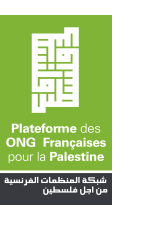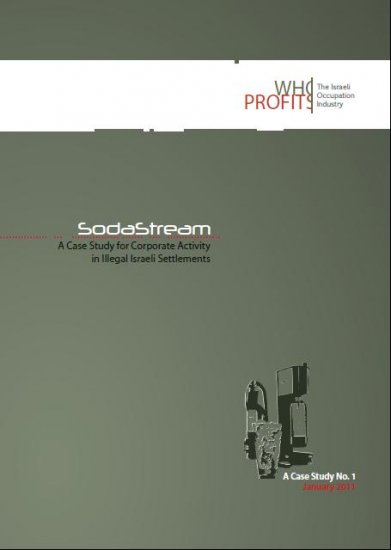


L’industrie dans les colonies - le cas de Soda Stream - Nouveau rapport (en anglais) de l’ONG israélienne Who Profits
The report provides an extensive overview, including the identity of the manufacturers, employment conditions, land confiscation and trade in settlement products. The report shows how the success of SodaStream and other companies which produce in settlements is based, at least in part, on the structural advantages that these companies enjoy, such as tax incentives, lax enforcement of regulations, as well as additional governmental support.
The report also exposes the manner in which the company conceals the fact that its products are manufactured in a West Bank settlement by using the Made in Israel label. The company, therefore misleads consumers to believe that its products are manufactured in Israel rather than in occupied land.
The business of SodaStream is growing rapidly. Its products are sold in 39 countries and can be found in retail stores like Macy’s, Bed Bath and Beyond, Bloomingdale’s, Coop, Carrefour and Migros. On November 8, 2010, the company has gone public and its shares are traded on NASDAQ. The SodaStream devices are especially popular in Sweden ; the company has recently announced that it has sold more than 1 million devices there.
The report provides an unprecedented insight into the internal considerations of a settlement producer, weighing consumer boycotts and possible negative publicity against the economic benefits of operating from a settlement. By its own admission, SodaStream states that calls for boycott are indeed a « risk factor » and a cause for « rising political tensions and negative publicity ». However, the company declares that moving its factory out of the settlement would require the expenditure of resources and, more importantly, « limit certain of the tax benefits for which we are currently eligible. » These benefits stem from the fact that the Israeli government provides economic incentives, including tax deductions, for businesses operating in West Bank settlements.
– Lire le rapport
Partager / imprimer




Rechercher par thématique
Colonisation Produits des colonies Entreprises et droits humains
Rechercher par type de ressources
rapport
Articles associés
 4 novembre 2024
4 novembre 2024Lettre ouverte au Ministre des Affaires étrangères - Présence du ministre israélien Bezalel Smotrich à Paris le 13 novembre Colonisation Droit international
 22 octobre 2024
22 octobre 2024Colonies, les chiffres-clés 2024 Colonisation Produits des colonies Economie et développement
 21 octobre 2024
21 octobre 2024[Edition spéciale] Gaza, une guerre de l’information Analyses politiques et géopolitiques Promotion de la paix et de la non violence La question palestinienne en France Entreprises et droits humains Cour Pénale Internationale Solidarité internationale Défenseur.e des droits de l’Homme Torture et mauvais traitements Histoire/analyse politique Economie et développement Détention administrative Prisonniers palestiniens Positions officielles de la France Aide internationale Liberté d’expression Diplomatie Impunité Crime de guerre Colonisation Bande de Gaza Commerce solidaire Hamas Droit international Apartheid Médias Journalisme
Campagne en cours
Dernières publications
 4 novembre 2024
Lettre ouverte au Ministre des Affaires étrangères - Présence du ministre israélien Bezalel Smotrich à Paris le 13 novembre
Colonisation
Droit international
4 novembre 2024
Lettre ouverte au Ministre des Affaires étrangères - Présence du ministre israélien Bezalel Smotrich à Paris le 13 novembre
Colonisation
Droit international
 24 octobre 2024
Appel à un cessez-le-feu à Gaza, au Liban et en Israël et à la fin de l’impunité dans un contexte de catastrophe humanitaire croissante et d’escalade des conflits régionaux
Bande de Gaza
Impunité
24 octobre 2024
Appel à un cessez-le-feu à Gaza, au Liban et en Israël et à la fin de l’impunité dans un contexte de catastrophe humanitaire croissante et d’escalade des conflits régionaux
Bande de Gaza
Impunité
> Toutes les publications






